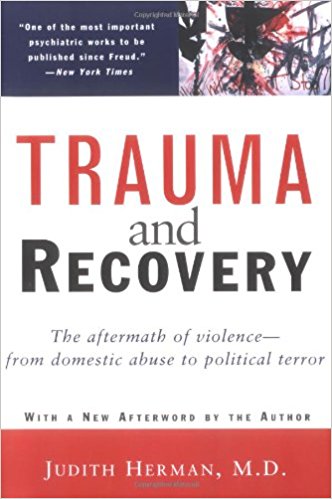Trauma and Recovery Summary
3 min read ⌚
 The Aftermath of Violence – From Domestic Abuse to Political Terror
The Aftermath of Violence – From Domestic Abuse to Political Terror
“Trauma and Recovery” is an eye-opening book that put in plain English, what we must do to confront the bullies and reduce their influence in this world.
About Judith Herman
 Despite being an author, Judith Lewis Herman, teaches clinical psychiatry at Harvard University.
Despite being an author, Judith Lewis Herman, teaches clinical psychiatry at Harvard University.
“Trauma and Recovery Summary”
Traumatic experiences can have a different impact depending on the person’s character. You can either be completely terrified or experience some internal shift. Judith Herman driven by revolutionary ideas investigates how trauma endangers our way of life and influence the human psyche, regardless of its origins.
The author is mainly inspired by the feminist standpoint and examines the collision between agony and momentary shock. The 70s are considered to be the worst years of unrest attributed to domestic abuse, rape, workplace abuse of power, and illegal activities to quiet down those preparing a response.
Making split-second decisions is in our blood. Rushing to solve the issue without taking into account many other factors is an impulse rising from anger and insecurity. Finding a motive to subdue this instinct is like playing in dangerous territory. Humans are prone to react to defend their position and to preserve the order.
When trauma attacks and seriously threatens a person’s self-defense instinct, it triggers a posttraumatic stress disorder (PTSD). The symptoms are categorized into three main classes:
- “Hyperarousal” – Traumatized people are constantly on alert for anything suspicious.
Symptoms include sleep disorder, never-ending suspicion, mood swings, irrational behavior, depression, anxiety, etc.
- “Intrusion” – In truth, the PTSD forms a defensive mechanism after the traumatic event, which keeps the victim on the lookout for any hidden danger.
The trauma is transforming from periodical to absolute, always fixated in their heads and that includes both sleeping and daytime periods.
- “Constriction” – Some victims even experience a shift in consciousness due to the dangerous situation that prompts them to be on full alert.
The symptoms of this restricted state include a sense of insecurity, damaged orientation, mood swings, passivity, unwillingness to admit the problem.
In order to recover, the captives must acknowledge the situation and accept treatment. Understanding what they’ve been through is only stage one.
The recovery process must be fueled with real care and supervision of those who are in need of protection.
Key Lessons from “Trauma and Recovery”
1. Various forms of control and dominance
2. Contribute to eradicate this mindset
3. The recovery is never easy
Various forms of control and dominance
Keeping the victim status is vital so that the captive will more easily accept the repeated abuses. Throughout history especially in war camps, people testified about monstrous forms of torture.
Captivity is also illustrated through religious obedience and lack of freedom.
Contribute to eradicate this mindset
We must instigate a complete dissolution of these prison systems. You don’t need bars to realize that your voice will never be heard – a situation well-known to many women throughout the globe.
Domestic abuse continues to increase, “keeping the victims isolated with no connections to the rest of the world” is the primary weapon.
The recovery is never easy
When you lose all the trust, it’s hard to regain it. People in charge of providing unconditional support and compassion to the victims note that sometimes it’s virtually impossible to recover fully.
Some events will leave a mark, and the main thing is to prevent any suicide attempts.
Like this summary? We’d Like to invite you to download our free 12 min app, for more amazing summaries and audiobooks.
“Trauma and Recovery” Quotes
Helplessness and isolation are the core experiences of psychological trauma. Empowerment and reconnection are the core experiences of recovery. Share on X The survivor who has accomplished her recovery faces life with few illusions but often with gratitude. Share on X The psychological distress symptoms of traumatized people simultaneously call attention to the existence of an unspeakable secret and deflect attention from it. Share on X Psychological trauma is an affliction of the powerless. Share on X Traumatic events call into question basic human relationships. Share on X
Emir is the Head of Marketing at 12min. In his spare time, he loves to meditate and play soccer.


 The Aftermath of Violence – From Domestic Abuse to Political Terror
The Aftermath of Violence – From Domestic Abuse to Political Terror



